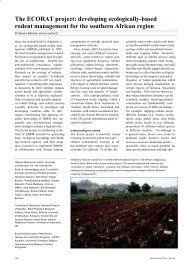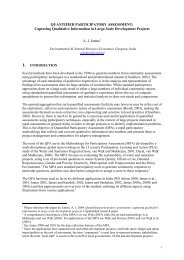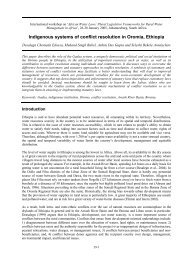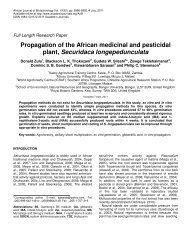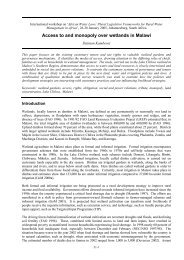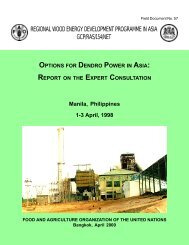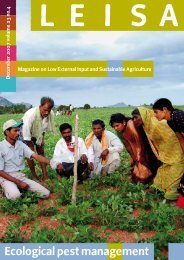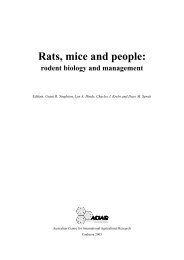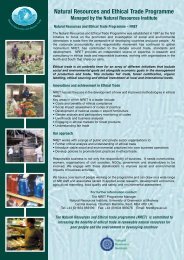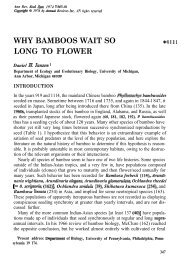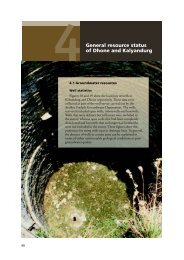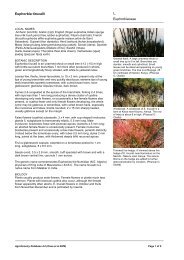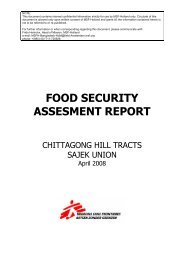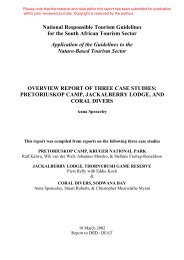Download full report in pdf format - Natural Resources Institute
Download full report in pdf format - Natural Resources Institute
Download full report in pdf format - Natural Resources Institute
Create successful ePaper yourself
Turn your PDF publications into a flip-book with our unique Google optimized e-Paper software.
Figure 44 and 45 summarise f<strong>in</strong>d<strong>in</strong>gs relat<strong>in</strong>g<br />
to the participation of women <strong>in</strong> community<br />
decision-mak<strong>in</strong>g <strong>in</strong> Kalyandurg and Dhone<br />
respectively. These figures show that <strong>in</strong><br />
Kalyandurg women were only participat<strong>in</strong>g <strong>in</strong><br />
meet<strong>in</strong>gs <strong>in</strong> 17% of the villages and participat<strong>in</strong>g<br />
and <strong>in</strong>fluenc<strong>in</strong>g decisions <strong>in</strong> 4% of the villages.<br />
In Dhone, women were participat<strong>in</strong>g <strong>in</strong> meet<strong>in</strong>gs<br />
<strong>in</strong> 14% of the villages and participat<strong>in</strong>g and<br />
<strong>in</strong>fluenc<strong>in</strong>g decisions <strong>in</strong> 5% of the villages.<br />
For Kalyandurg <strong>in</strong> particular, there is a stark<br />
contrast between the figures on the participation<br />
of the poor and of women <strong>in</strong> meet<strong>in</strong>gs.<br />
These f<strong>in</strong>d<strong>in</strong>gs confirm that, although poor men<br />
participate <strong>in</strong> meet<strong>in</strong>gs, women, and particularly<br />
poor women, rarely participate <strong>in</strong> meet<strong>in</strong>gs.<br />
In summary, despite impressive advances <strong>in</strong><br />
women’s empowerment through the SHG<br />
movement <strong>in</strong> Andhra Pradesh, women still do<br />
not participate effectively <strong>in</strong> community decisionmak<strong>in</strong>g.<br />
Even <strong>in</strong> a mandal like Kalyandurg,<br />
which has a good record <strong>in</strong> remedial action<br />
by panchayats and community participation,<br />
participation by women <strong>in</strong> community decisions<br />
is low. In a majority of the habitations (all<br />
except 2), women were either not <strong>in</strong>volved <strong>in</strong><br />
community decision-mak<strong>in</strong>g, or did not<br />
attend meet<strong>in</strong>gs or <strong>in</strong>fluence major decisions<br />
on community issues relat<strong>in</strong>g to water and<br />
sanitation.<br />
5.6 Access to irrigation water<br />
Access to reliable water supplies for irrigation,<br />
livestock and other productive purposes is<br />
extremely important to the livelihoods of a large<br />
number of people liv<strong>in</strong>g <strong>in</strong> the study mandals.<br />
Although there is some growth <strong>in</strong> the service<br />
sector, the majority still rely heavily on<br />
agricultural production. There is a strong belief<br />
amongst small and marg<strong>in</strong>al farmers, based on<br />
experience, that ga<strong>in</strong><strong>in</strong>g access to water resources<br />
and becom<strong>in</strong>g an irrigator farmer is a reliable<br />
means of escap<strong>in</strong>g from poverty. Hence,<br />
considerable amounts of money have been and<br />
cont<strong>in</strong>ue to be <strong>in</strong>vested <strong>in</strong> borewell construction<br />
<strong>in</strong> Dhone and Kalyandurg. Private borewell<br />
<strong>in</strong>vestments total around Rs. 4 crores <strong>in</strong> Dhone<br />
and around Rs. 22 crores <strong>in</strong> Kalyandurg (based<br />
on a cost of Rs. 35,000 per borewell at 2002<br />
prices). This level of <strong>in</strong>vestment reflects the<br />
relative profitability of irrigated cropp<strong>in</strong>g.<br />
However, over-exploitation of groundwater <strong>in</strong><br />
both study mandals has led to a situation whereby<br />
<strong>in</strong>vestments <strong>in</strong> irrigation have become a<br />
widespread cause of poverty (see Box 16).<br />
Box 15. Villagers’ views on women’s<br />
participation <strong>in</strong> decision-mak<strong>in</strong>g<br />
“Women are not <strong>in</strong>cluded <strong>in</strong> community<br />
meet<strong>in</strong>gs. They are scared to participate.<br />
Women participate only for their<br />
problems, and are not <strong>in</strong>volved <strong>in</strong><br />
community problem solv<strong>in</strong>g.” (Manirevu).<br />
“Men are not giv<strong>in</strong>g much importance to<br />
women’s participation <strong>in</strong> community<br />
meet<strong>in</strong>gs.” (Obalpuram).<br />
“Women are not encouraged to participate<br />
<strong>in</strong> community decisions, even though<br />
most of them have m<strong>in</strong>imum education.”<br />
(Kadadarakunta).<br />
“Women are not be<strong>in</strong>g allowed and also<br />
women are not <strong>in</strong>terested <strong>in</strong><br />
participat<strong>in</strong>g.” (Venkatampalli).<br />
“Women ma<strong>in</strong>ly participate <strong>in</strong> Vidya<br />
Committee meet<strong>in</strong>gs. But once they made<br />
a dharna for water problem at Kalyandurg<br />
MRO office.” (Vitlampalli).<br />
“Women participated <strong>in</strong> community<br />
decision-mak<strong>in</strong>g; asked for community<br />
latr<strong>in</strong>es. Decision taken and work also<br />
done.” (Mudigal).<br />
“DWCRA groups participated <strong>in</strong> road<br />
<strong>format</strong>ion by shramadan. Women attend<br />
community and Gram Sabha meet<strong>in</strong>gs and<br />
speak about their problems.” (Golla).<br />
Overhead tank <strong>in</strong> Kocheruvu, Dhone<br />
69



